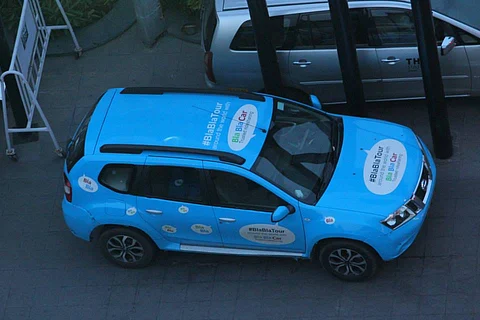

Last month, Jagan Kumar J, a resident of Bengaluru, submitted a written complaint to the Commissioner of Police seeking an investigation into the services of BlaBlaCar, the world's largest long-distance ride-sharing community.
His complaint however wasn’t just regarding safety implications of a potentially criminal driver, but also the co-passengers who use the car-pooling service.
Kumar, in his complaint, claims that "There are no regulations or adequate checks to ensure safety of its customers and that the company claims that they are not responsible for any false, incomplete, misleading or fraudulent information provided by its members." He feels such a service threatens the safety of commuters, especially women and the elderly, who would travel with co-passengers unknown to them.
In his complaint, Kumar further alleges that "There is also violation of the Motor Vehicle Act as Section 66 prohibits using private vehicles for hire or rewards." He further states that data collected by the company is not secure and can be misused if it falls into the wrong hands.
BlaBlaCar launched its services in India in January this year. The French start-up is worth an estimated €1.5bn and went from 10 million to 20 million "members", including car drivers and users, in just the last year.
But how safe is the concept of car-pooling in a place like India, where cab services are facing a tough time to ensure even driver accountability, against the backdrop of several incidents of crime against women allegedly by cab drivers? And, more importantly, is the average Indian ready to let go of his/her apprehensions and to trust to share a ride with strangers?
BlaBlaCar mentions a host of safety measures it employs to "create the environment for a secure ridesharing community."
These include using only real identities of people (and not allowing the use of pseudonyms). Phone numbers and emails are both verified and the app offers the option of connecting one's BlaBlaCar profile to their social network account. Members get to choose their travel companions and the rating option helps them decide the driver or co-commuters they wish to share a ride with.
While the usual merits of carpooling, like reducing pollution and congestion on the roads, saving fuel, energy, time and for some even getting to meet new people, are worth considering, trusting virtual information can often act as a deterrent for many, wanting to use the service.
"Travelling with people you know can be a risk these days. And sharing a ride with unknown persons is definitely uncomfortable. Anything can happen," says Kumar.
"What if the car owner uses a duplicate number plate? Or the car owner could be genuine person, but what if the passenger has a criminal record? In case of BlaBlaCar there is no verification of the person and the company also does not provide any address to their physical office in India. Meru is at least registered and the vehicles can be traced," he says.
Kumar also feels that not many people take the effort to read the terms and conditions before using such apps.
Siddharth Jagtiani, founder of carEgiri which provides ride-sharing service focusing on those commuting to and from work in Pune and Bengaluru, says that even after over a year of being operational, it "faces the same problem of getting people used to the idea of dropping a stranger on their way."
"With over 5,000 people registered on the platform, we have seen over 200 trips happening daily over the platform but habits are tough to change," Jagtiani told Scroll earlier this year.
But the challenges of carpooling in India, are not limited to our low capacity of trust, but can be attributed to several other factors as well.
Shrinath V in a piece for Your Story writes why he thinks carpooling in India will fail.
"Carpooling firms may have done all the background verification about people I need to pick up along the way, but all I need is one bad experience to put me off. It could be as trivial as a guy with a weird sense of humor, a back-seat driver who’s telling me what to do on the road (me?! doesn’t he know I’ve been driving forever? I never make mistakes on the road) or even someone who’s constantly talking on the phone when he’s in my car. My car is MY space, and he’s violating it. I’m not the driver; I’m the owner of the car and I should have control over my space," Shrinath writes.
The wheels however turn when it comes to the perspective of the passenger who might feel is the king and would not be okay to wait for the car or if the AC is not working, because I-am-paying-for-it.
This may not work as a generalisation, because those wanting to share a ride are likely to be used to the inconveniences of public transport.
But BlaBlaCar is on a roll. With 20 million members across 19 countries, BlaBlaCar got $200 million in venture funding in October this year. Ride-sharing service in India is still at a nascent stage and may take some time to become popular. But with increasing worries on its safety aspects, the jury is still out on whether it will work in India.